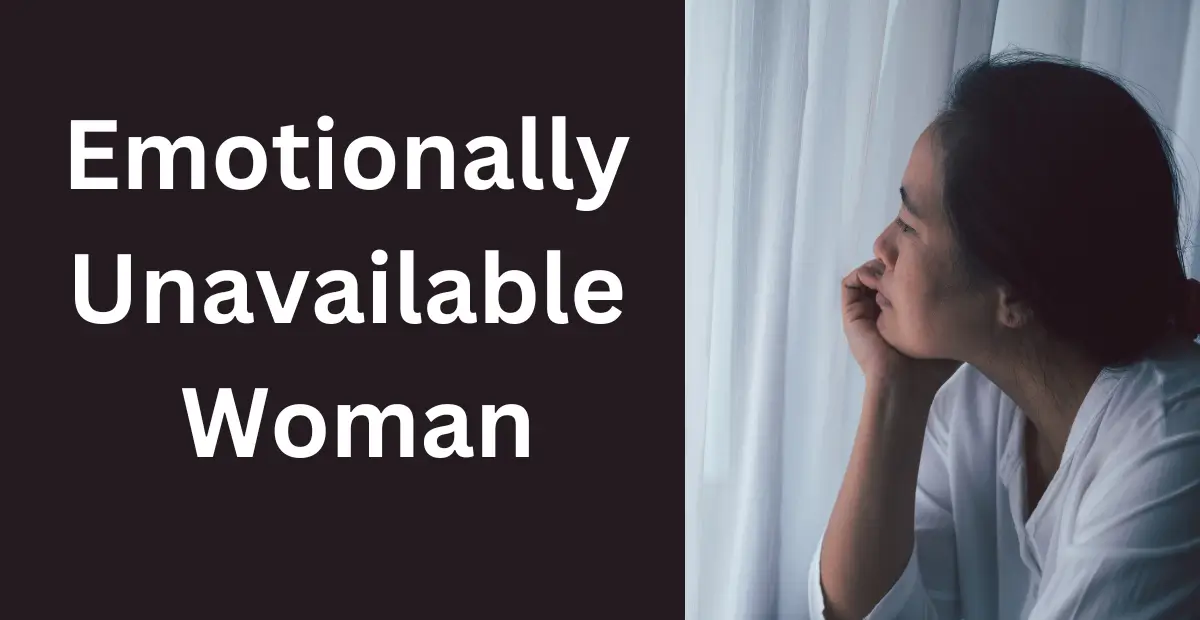An emotionally unavailable woman is someone who struggles to open up and be vulnerable in a relationship. She may have difficulty expressing her emotions or maintaining emotional intimacy with her partner. This can make it challenging for her to form deep, meaningful connections with others.
While this term is often used in the context of romantic relationships, it can also apply to friendships and family relationships. An emotionally unavailable woman may struggle with forming close bonds in all areas of her life. In this blog post we will discuss 9 signs of an emotionally unavailable woman, causes, impact on relationships and family and how to support an emotionally unavailable woman.
What is Emotional Unavailabilty?

Emotional unavailability is a common term used in the field of psychology and relationships. It refers to someone who has difficulty expressing or managing their emotions, making it difficult for them to form deep and meaningful connections with others.
Individuals who are emotionally unavailable may be described as closed off, distant, or avoidant. They often struggle with intimacy and commitment, as well as expressing their feelings and needs to their partners.
9 Signs of an Emotionally Unavailable Woman

If you want to know an emotionally unavailable woman, look out these signs:
1. She struggles to communicate her feelings
A significant indication of an emotionally unavailable woman is her consistent struggle in expressing her emotions. This can manifest in various ways, such as avoiding discussions about her feelings or completely shutting down when confronted with emotional conversations.
Due to her emotional barriers, she may find it challenging to open up and connect on a deeper level with others.She keeps her distance: An emotionally unavailable woman may keep a physical or emotional distance from her partner. This can manifest as reluctance to hold hands, hug, or share personal space.
2. She avoids commitment
Commitment can be a daunting prospect for an emotionally unavailable woman. The idea of opening up, being vulnerable, and potentially getting hurt can create a sense of fear and hesitation. Consequently, she may find herself reluctant to fully invest in a serious relationship, preferring to maintain a certain level of emotional distance.
This self-preserving behavior can stem from past experiences or personal insecurities, ultimately shaping her approach to commitment.
3. She puts up emotional walls
An emotionally unavailable woman, often due to past experiences or unresolved emotions, may struggle to let people truly connect with her on a deeper level. She might erect emotional barriers as a defense mechanism, shielding herself from the vulnerability that comes with opening up and the fear of potential hurt or rejection.
These walls she builds, though protective, can also prevent her from experiencing the genuine connection and intimacy she may secretly desire.
4. She has trouble trusting others
Trust is an indispensable pillar for fostering strong and meaningful relationships. However, an emotionally unavailable woman, due to past experiences that have left her wounded, may find it challenging to bestow her trust upon others and lower her emotional defenses.
5. She avoids deep conversations
Emotional intimacy can be quite challenging for someone who is emotionally unavailable. This person may find it difficult to open up and share their deepest emotions and thoughts with others, often preferring to keep conversations at a surface level.
They may shy away from discussing their fears, vulnerabilities, and past experiences, ultimately creating a barrier between themselves and others. Building trust and creating a safe environment for them to express themselves can be a gradual process, requiring patience and understanding from both parties involved.
6. She has difficulty showing empathy
Empathy, often described as the ability to understand and share the feelings of another person, plays a crucial role in building meaningful connections and nurturing relationships. However, in the context of an emotionally unavailable woman, the struggle to express empathy can pose challenges in being there for her partner or loved ones.
This can create a barrier in truly connecting and providing the support needed in emotional moments, making it important to address and explore ways to foster emotional availability and empathy.
7. She has a fear of intimacy
Intimacy, the profound connection between two individuals, is a delicate dance that requires vulnerability, trust, and a deep understanding of each other’s emotions and needs. For someone who is emotionally unavailable, the prospect of opening up and exposing their true self can be terrifying. They may have experienced past hurts or traumas that have left them with walls built around their heart, shielding them from potential pain.
These walls, although intended to protect, can inadvertently hinder the exploration of deep emotional connections and inhibit the growth of relationships. It is a complex journey of self-discovery and healing, where gradual steps are taken to dismantle those walls and embrace the beauty of intimacy.
8. She is emotionally distant
An emotionally unavailable woman, often characterized by her distant and detached demeanor, may exhibit challenges in forming deep emotional connections, even within close relationships. She may appear aloof or cold, unintentionally creating barriers that hinder the establishment of meaningful emotional bonds.
This emotional unavailability can stem from various factors, such as past experiences or personal fears, which contribute to her difficulties in fully engaging and connecting with others on an intimate and vulnerable level.
9. She avoids conflict
Conflict can be uncomfortable for anyone, but an emotionally unavailable woman may go to great lengths to avoid it. Due to her fear or discomfort, she may become defensive or withdraw when confronted with conflict, making it challenging to find resolution and address issues within the relationship.
This pattern of avoidance can hinder open communication and hinder the growth and stability of the relationship, potentially leading to unresolved conflicts and unmet needs. It is crucial to create a safe and supportive environment for open dialogue and work towards building emotional intimacy and understanding.
Causes of Emotionally Unavailable Woman

There is no one definitive cause of emotional unavailability in women. It can be a result of past experiences, personality traits, or learned behaviors. Some possible causes include:
- Childhood trauma: Experiences such as neglect, abuse, or loss during childhood can lead to emotional unavailability in adulthood. These experiences can create a fear of intimacy and vulnerability.
- Fear of rejection: Someone who is emotionally unavailable may have a deep-seated fear of rejection, making it challenging for them to open up and form close relationships.
- Difficulty regulating emotions: Some individuals may struggle with managing their emotions and find it easier to shut down or withdraw rather than confront them.
- Learned behaviors: Growing up in a family where emotions were not openly expressed or valued can also contribute to emotional unavailability. Children may learn to suppress their emotions as a coping mechanism, which can carry into adulthood.
Impact on Relationships and Family
Being in a relationship with an emotionally unavailable woman can be challenging for both parties. It can lead to feelings of frustration, hurt, and loneliness. Some potential impacts on relationships include:
- Lack of emotional support: An emotionally unavailable woman may struggle to provide the emotional support that her partner needs. This can leave the partner feeling unsupported and unfulfilled in the relationship.
- Difficulty with conflict resolution: Conflict is a natural part of any relationship, but an emotionally unavailable woman may struggle to work through issues effectively. This can lead to unresolved conflicts and resentment.
- Feeling disconnected: Emotional unavailability can make it challenging for a couple to form deep, meaningful connections. As a result, both parties may feel emotionally distant and disconnected from each other.
- Struggle with intimacy: Intimacy requires emotional vulnerability, which an emotionally unavailable woman may struggle with. This can lead to a lack of physical and emotional intimacy in the relationship.
- Impact on children: Emotional unavailability can also affect family relationships, especially for couples with children. Children may feel emotionally neglected or struggle to form close bonds with an emotionally unavailable parent.
How to Support an Emotionally Unavailable Woman
If you are in a relationship with an emotionally unavailable woman, there are steps you can take to support her and work towards building a stronger emotional connection. Some suggestions include:
- Communicate openly: In order to foster a safe and nurturing environment for open communication, it is important to create a space where both parties feel comfortable expressing their emotions and needs. This can be achieved by actively listening to one another, practicing empathy, and promoting a non-judgmental atmosphere. By encouraging honest and respectful dialogue, we can establish a foundation of trust and understanding, allowing for deeper connections and effective problem-solving.
- Be patient and understanding:Building emotional availability takes time and patience. It involves cultivating a deep sense of understanding and empathy towards your partner’s struggles and actively supporting them in their personal journey of growth and self-discovery. By fostering a safe and nurturing environment, you create the space for open communication and vulnerability, allowing your relationship to flourish and deepen on profound emotional levels. Remember, emotional availability is a continuous process of learning and growth that requires ongoing commitment and effort from both partners.
- Encourage therapy or counseling:If past traumas or challenging experiences are contributing to emotional unavailability, seeking therapy can be highly beneficial. Through therapy, individuals can address and work through these issues, gaining a deeper understanding of themselves and their emotions.
- In addition, when supporting a partner dealing with emotional unavailability, it is crucial to show empathy and compassion. By validating their feelings and demonstrating understanding, we create a safe and supportive space for them to share their struggles and find solace. It is through this compassionate approach that we can foster healing and growth in our relationships.
- Set boundaries: While it is undeniably significant to provide support to your partner, it is equally crucial to establish clear boundaries and prioritize the preservation of your own emotional well-being. By setting healthy limits, you can ensure a balanced and sustainable relationship dynamics, fostering a sense of mutual respect and individual growth. Taking care of yourself allows you to be more present and available for your partner, enhancing the overall quality of your connection. Remember, self-care is an essential ingredient for a thriving and fulfilling partnership.
Conclusion
Emotional unavailability in women is a complex issue that can stem from various causes. It can have significant impacts on relationships and families, but with understanding, support, and patience, it is possible to work through these challenges together. If you are an emotionally unavailable woman, know that there is no shame in seeking help and working towards emotional growth and connection. With the right support, you can overcome your barriers and form deep, fulfilling relationships.
So, it’s essential to prioritize self-care and work on building trust with yourself and others. Remember that being emotionally available is a process, not an endpoint, but it is worth the effort for healthier and more meaningful relationships. So, let’s continue to have open and honest conversations about emotional unavailability and support each other in our journey towards emotional growth.
Let’s break the stigma and create a more emotionally connected world. The path may not be easy, but it is possible with patience, understanding, and love.
